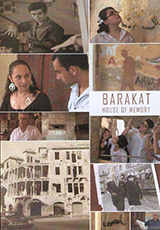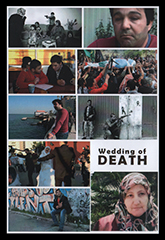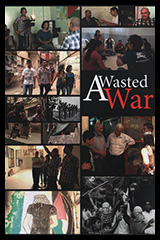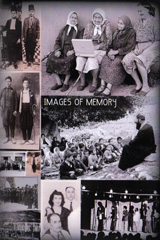Tartugo Films - Student Films
Barakat - House of Memory.
 There is something intriguing about this old building at Sodeco Square, also called Barakat Building or The Yellow House. Located at a busy intersection in the heart of Beirut, 15 years of destruction and war couldn’t destroy the beauty of the building’s unique architecture. And despite of being a war ruin, where nobody could live in anymore, even not squatters, a courageous man re-opened his barbershop “Salon Ephrem pour Dames”. He emptied his small property from rubble and the sand bags left there by snipers, renovated his salon and painted the walls and continued where he was forced to stop in 1976 due to the war: as a hairdresser for the ladies of Achrafieh. Ephrem’s story is one of many untold stories of war. And the Barakat building is home to many stories of war. “This building summarizes the history of war. It evokes the memory of the city of Beirut, the sweet and the bitter one”, says Mona Hallak, a young architect. Due to her years-long struggle, this building wasn’t sold to investors and destroyed after the war. Under the auspices of the Municipality of Beirut, it will become a museum, or a House of Memory.
There is something intriguing about this old building at Sodeco Square, also called Barakat Building or The Yellow House. Located at a busy intersection in the heart of Beirut, 15 years of destruction and war couldn’t destroy the beauty of the building’s unique architecture. And despite of being a war ruin, where nobody could live in anymore, even not squatters, a courageous man re-opened his barbershop “Salon Ephrem pour Dames”. He emptied his small property from rubble and the sand bags left there by snipers, renovated his salon and painted the walls and continued where he was forced to stop in 1976 due to the war: as a hairdresser for the ladies of Achrafieh. Ephrem’s story is one of many untold stories of war. And the Barakat building is home to many stories of war. “This building summarizes the history of war. It evokes the memory of the city of Beirut, the sweet and the bitter one”, says Mona Hallak, a young architect. Due to her years-long struggle, this building wasn’t sold to investors and destroyed after the war. Under the auspices of the Municipality of Beirut, it will become a museum, or a House of Memory.
A film by Lebanese high school students from Archafieh/Beirut and Bchemoun
Project supervisor: Christina Foerch Saab
A Tartugo Films production
A Permanent Peace Movement project
Funded by Federal Republic of Germany Foreign Office
And Institute for Foreign Relations (ifa)
Beirut 2013 all rights reserved
Running time: 19 minutes
Wedding of DEATH
A student film by Lebanese high school students from Tripoli about the use of weapons in Lebanon
 A woman got shot in her head while she was throwing rice on the bride during a wedding celebration. Shootings in the air during celebrations are regarded as part of Lebanese culture. A woman got killed, though. It was an accident. Was it an accident? Can careless shootings in the air be categorized as accidents? Or are they already actions, even though they weren’t intentional, that can be categorized as crimes? Since the beginning of 2011 till September 2011, the toll was 1200 victims of security accidents where firearms were used. This includes killings by stray bullets on occasions such as weddings and funerals. It also includes “normal” crimes such as robberies, murders, or honor killings. They occur all over the country. In this film, a group of students from Tripoli investigates how the use of small arms can affect normal people’s lives.
A woman got shot in her head while she was throwing rice on the bride during a wedding celebration. Shootings in the air during celebrations are regarded as part of Lebanese culture. A woman got killed, though. It was an accident. Was it an accident? Can careless shootings in the air be categorized as accidents? Or are they already actions, even though they weren’t intentional, that can be categorized as crimes? Since the beginning of 2011 till September 2011, the toll was 1200 victims of security accidents where firearms were used. This includes killings by stray bullets on occasions such as weddings and funerals. It also includes “normal” crimes such as robberies, murders, or honor killings. They occur all over the country. In this film, a group of students from Tripoli investigates how the use of small arms can affect normal people’s lives.
Project supervisor: Christina Foerch Saab
A Tartugo Films production
A Permanent Peace Movement project
Funded by Federal Republic of Germany Foreign Office
And Institute for Foreign Relations (ifa)
Beirut 2012 All rights reserved
Running time: 13 minutes
A Wasted War
 1985, Palestinian camp of Shatila, Beirut. It’s the dark days of the Lebanese civil war; a war that was also fought between Lebanese and Palestinians. Nowadays, hardly anyone pays attention to the so-called camps war. Today’s youth know practically nothing about this chapter of war history. Therefore, Lebanese students from all over the country explore what happened during the camps war. They visit Shatila camp and speak to Palestinians about their memories. And they also try to understand the Lebanese side and interview an ex-fighter from Amal Movement.
1985, Palestinian camp of Shatila, Beirut. It’s the dark days of the Lebanese civil war; a war that was also fought between Lebanese and Palestinians. Nowadays, hardly anyone pays attention to the so-called camps war. Today’s youth know practically nothing about this chapter of war history. Therefore, Lebanese students from all over the country explore what happened during the camps war. They visit Shatila camp and speak to Palestinians about their memories. And they also try to understand the Lebanese side and interview an ex-fighter from Amal Movement.
A documentary by Lebanese high school students about the camps war.
“It’s the first time anyone ever asks us about the camps war.”
Abou Imad Shatila, former Palestinian fighter.
Project supervisor: Christina Foerch Saab
Executive producer: Ziad Saab
A Tartugo Films production
A Permanent Peace Movement project
Funded by Federal Republic of Germany Foreign Office
And Institute for Foreign Affairs (ifa)
Beirut 2012 All rights reserved
Running time: 18 minutes
Images of Memory
 Lebanese high school students go on a quest to explore parts of modern history of their country. Through knocking on people’s doors, collecting old photographs and listening to their stories, the students learn that in the decades prior to the Lebanese civil war people used to live, work and celebrate together, no matter of the religious or political belonging of the “other”. Then the Lebanese civil war broke out in 1975. But even during the war years, people tried to live a normal life: celebrating weddings or beach parties for example. Just sometimes, “we had to switch off the lights, pack and go home, because fighting broke out,” remembers one interview. The students listen to the memories of director and actor Boutros Rouhana, who toured Lebanon with a multi-confessional theater group during the war days. And the Lebanese teenagers also hear about the dark sides of the war, about killings, destruction and displacement. “The one who helped us flee our village was Christian,” remembers an interviewee, herself being a Muslim. Even in the darkest days, the students discover that there were acts of humanity. Through collecting old photographs from different regions in Lebanon, and through listening to people’s testimonies, the students reveal the common heritage of their country, which is still at stake in the current post-war period of Lebanon.
Lebanese high school students go on a quest to explore parts of modern history of their country. Through knocking on people’s doors, collecting old photographs and listening to their stories, the students learn that in the decades prior to the Lebanese civil war people used to live, work and celebrate together, no matter of the religious or political belonging of the “other”. Then the Lebanese civil war broke out in 1975. But even during the war years, people tried to live a normal life: celebrating weddings or beach parties for example. Just sometimes, “we had to switch off the lights, pack and go home, because fighting broke out,” remembers one interview. The students listen to the memories of director and actor Boutros Rouhana, who toured Lebanon with a multi-confessional theater group during the war days. And the Lebanese teenagers also hear about the dark sides of the war, about killings, destruction and displacement. “The one who helped us flee our village was Christian,” remembers an interviewee, herself being a Muslim. Even in the darkest days, the students discover that there were acts of humanity. Through collecting old photographs from different regions in Lebanon, and through listening to people’s testimonies, the students reveal the common heritage of their country, which is still at stake in the current post-war period of Lebanon.
A documentary film by Lebanese high school students
from Barja, Byblos, Chhim, Joun and Ehmej
Project supervisor: Christina Foerch Saab
Produced by Tartugo Films
A Permanent Peace Movement project
Funded by the Federal Republic of Germany Foreign Office
In cooperation with the Ministry of Displaced People
Beirut 2011
Running time: 18 minutes
17 years 1 month 3 days
 In Dhour Shweir, a picturesque Lebanese mountain village, a teenager aged 17 dies in a gun accident. In this film, the local high school students investigate the case of their former classmate Elio who got shot by mistake and who consequently died from his injuries. A very touching, emotional film that appeals to parents, teachers, and youth to leave weapons in the place where they belong: locked away.
In Dhour Shweir, a picturesque Lebanese mountain village, a teenager aged 17 dies in a gun accident. In this film, the local high school students investigate the case of their former classmate Elio who got shot by mistake and who consequently died from his injuries. A very touching, emotional film that appeals to parents, teachers, and youth to leave weapons in the place where they belong: locked away.
A film by Lebanese high school students from Dhour Shweir and Barja
Project supervisor: Christina Foerch Saab
Produced by Tartugo Films
A Permanent Peace Movement project
Funded by the Norwegian Embassy Beirut
In cooperation with the Ministry of Displaced People
Beirut 2011
Running time: 18 minutes
Nour, Permanent Peace Movement
A young Lebanese dancer returns to her home country Lebanon after having spent years in exile in Paris. Slowly, she becomes acquainted with Beirut again. Then she starts to search for her past. She finds the house she used to live in. It’s still in ruins. An old picture she finds on the floor of the house reminds her of happier days with her family. But the ghosts of the civil war are still there. By chance, she passes by a high school. She becomes friends with some of the students and together, they launch a project: A theater play that deals with the ghosts of the Lebanese civil war.
This docu-fiction is the second film of a series of documentaries done in cooperation with Lebanese high school students. It is part of a project that aims at reconciliation through memory. Not to remain in the violent past, but to create a more peaceful future, that’s the aim of this project.
War Stories, Future TV, Permanent Peace Movement
War Stories is a documentary made by Lebanese high school students in the framework of the project “Memory and Reconciliation”. Not to forget in order not the repeat one of Lebanon’s darkest chapters of recent history, that’s the purpose of this project and this film. The students ask witnesses about the civil war. The outcome: nine different interviews, nine different stories, nine different points of view. For the first time in Lebanese post-war history, Lebanese students confront witnesses with questions about the war in front of the camera.